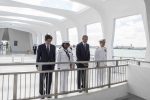Japanese Prime Minister Shinzo Abe was joined by President Obama on a solemn visit to Pearl Harbor to commemorate the 75th anniversary of the Japanese attack on Hawaii. The Dec. 27, 2016 visit mirrors a similar one in May 2016 when President Obama took a journey to Hiroshima as the first sitting president to visit the memorial.
When Abe’s visit was announced, the Japanese Foreign Ministry initially stated that this would be the first trip to Pearl Harbor by a sitting Prime Minister since World War II. Later it was discovered that at least three other sitting prime ministers, including Abe’s grandfather, had visited the base. While the historic quality of Abe’s visit failed to echo Obama’s visit to Hiroshima, the sentiments of thoughtful reflection on the atrocities of war and the spirit of tolerance and reconciliation were present in Abe’s speech.
“Showing respect even to an enemy they fought against; trying to understand even an enemy that they hated—therein lies the spirit of tolerance embraced by the American people,” Abe said.
The Vanguard spoke with Dr. Ken Ruoff, director of the Center for Japanese Studies at PSU, over email about the significance of the event. In addition to reciprocating for Obama’s recent visit to Hiroshima, Ruoff said, the visit served to reinforce U.S.-Japan relations as the political climate in the Pacific becomes increasingly uncertain.
“These symbolic gestures were to reaffirm the U.S.-Japan alliance at a time when the rise of China has many countries in Asia, especially Japan, concerned about security,” added Ruoff.
As China’s expansionism in the South China Sea continues, other traditional allies in the region, such as South Korea and the Philippines, find themselves occupied with a leadership crisis and a brutal drug war, respectively. In addition, President-elect Trump’s unconventional and unilateral style of diplomacy has been further cause of tension between the two giants.
One of the reasons the visits of previous Japanese prime ministers to Pearl Harbor went largely unreported is because of the political sensitivity of such an action. When asked about key barriers in understanding the relationship between the U.S. and Japan, Ruoff stressed that it is important to understand the transition that has taken place in Japan following the postwar period and up to today.
“The Japan of today is so different from wartime Japan, and yet many Americans are stuck in a time warp in reference to Japan,” Ruoff emphasized. “The Japan of today is one of the most pacifistic nation-states in the world, a solid liberal democracy, and a major defender of human rights.”
Article 9 of Japan’s constitution, which outlines their pacifist stance, states: “Aspiring sincerely to an international peace based on justice and order, the Japanese people forever renounce war as a sovereign right of the nation and the threat or use of force as means of settling international disputes.”
While these legal restrictions haven’t stopped Japanese government officials from loopholes to a 40 billion-dollar-a-year “Self Defense Force,” they have been remarkably effective at keeping Japan out of wars and various other foreign quagmires. As of last year, Japan is currently bombing 7 less countries than the U.S. (for a total of 0). However, three years before Abe would stand before the U.S.S. Arizona and declare the “quiet pride in the path we have walked as a peace-loving nation over these 70 years since the war ended,” his government oversaw a constitutional revision that represented a significant step towards his previously stated goal of shedding the constitutional limitations on Japan’s military.
The U.S. is certainly no stranger to abusing its own constitution, but with any luck, the relationship between Japan and the U.S. going forward will focus less on Machiavellian attempts to retain power at all costs. As Obama reflected on how easily violence is justified in the name of a higher cause and mourned those who died as the result of the terrible forces unleashed in the not-so-distant past, he touched a potential way out of this madness.
Calling on the past, Obama stated, “Their souls speak to us. They ask us to look inward, to take stock of who we are and what we might become.”
